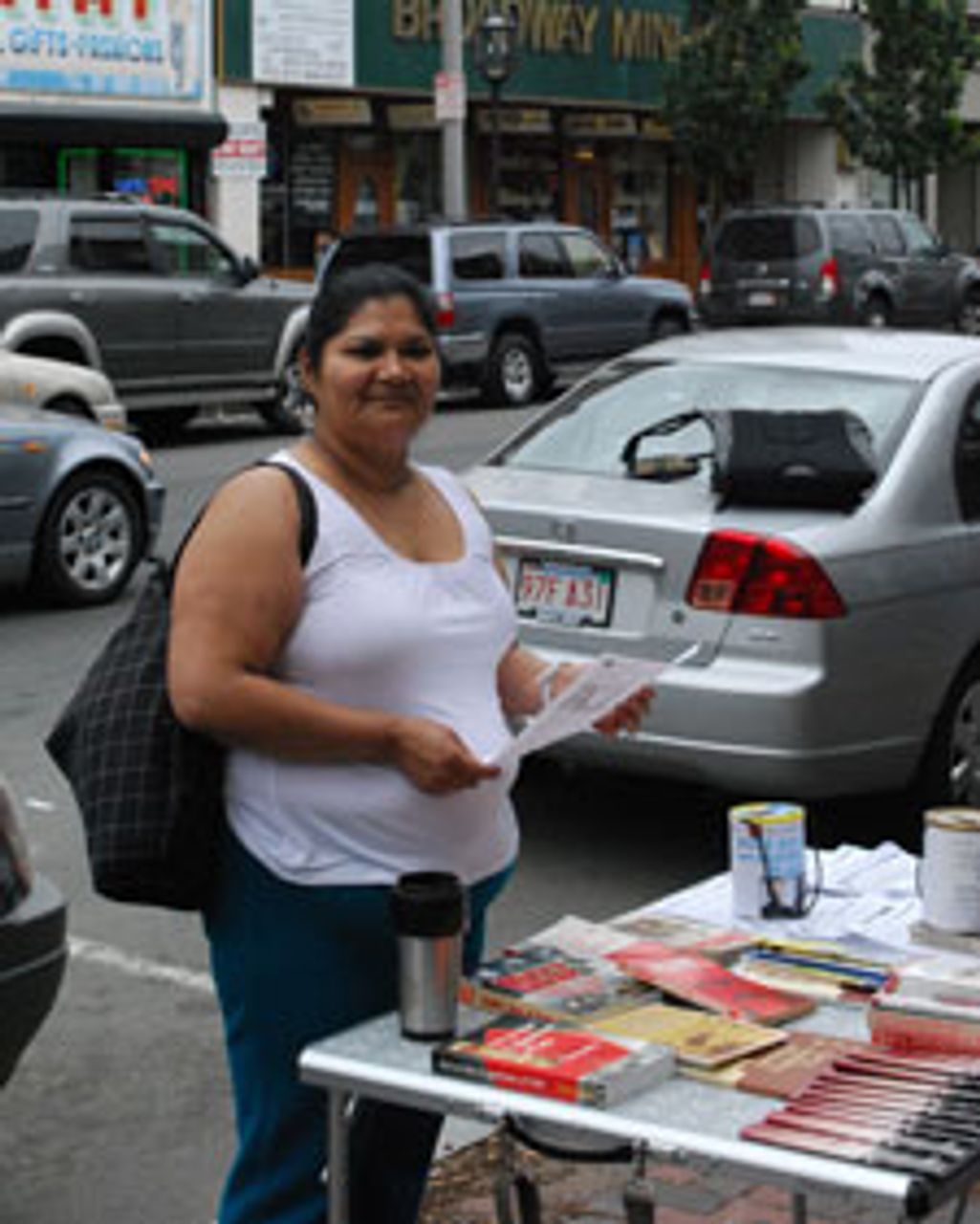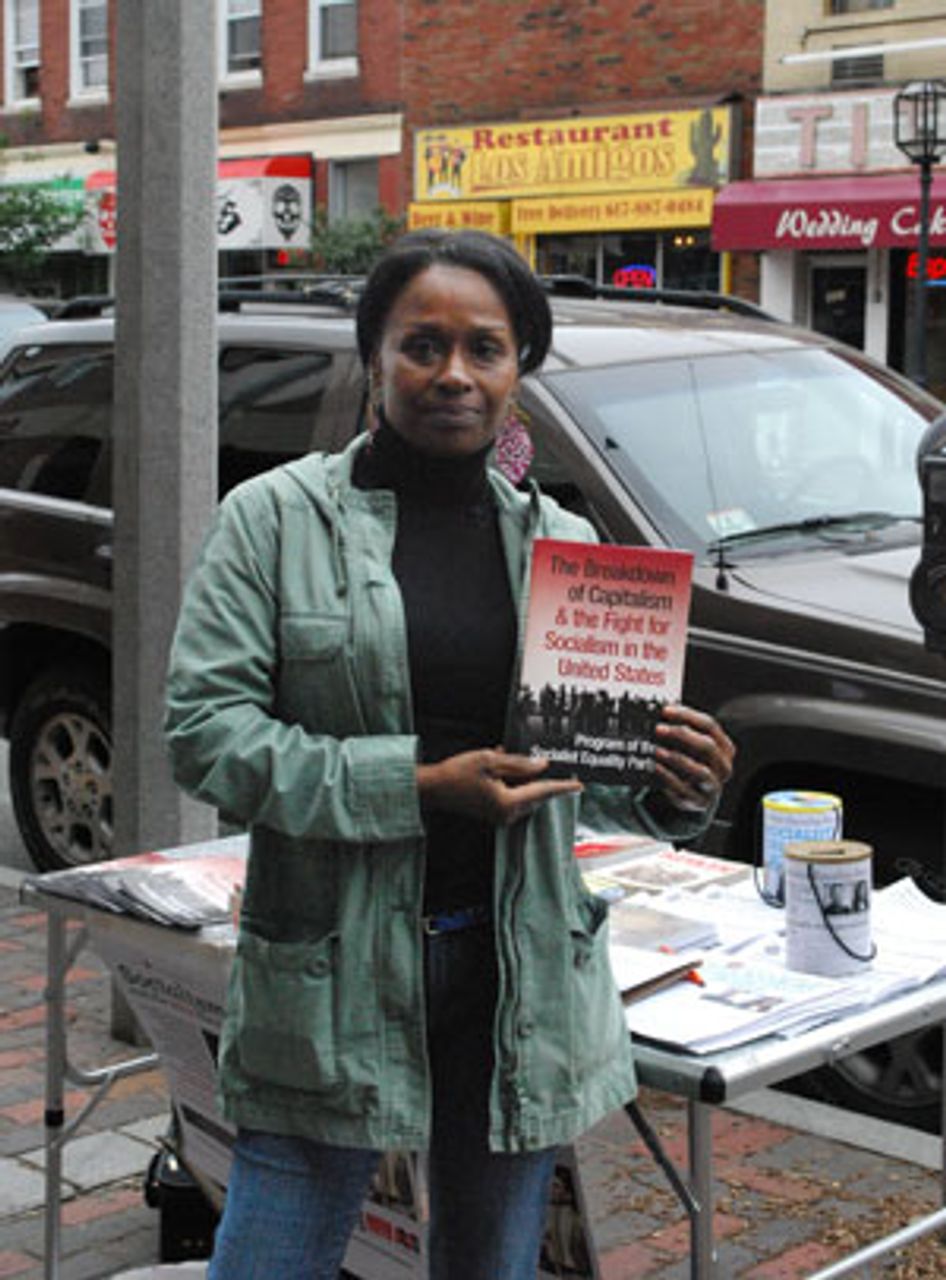The Socialist Equality Party campaigned Saturday in Chelsea, Massachusetts, a small, densely populated city just across the Mystic River from Boston. Campaigners distributed a number of statements by our candidates—Jerry White for president and Phyllis Scherrer for vice president—as well articles and commentaries from the World Socialist Web Site.
In particular, the article “Obama, Romney spell out right-wing economic programs in Ohio” and the WSWS Perspective “Fed report shows: Crisis has thrown back US families 20 years” generated interest from those passing by the campaign table.
The SEP team discussed with workers and young people that, in opposition to the Democrats and Republicans, our candidates see the right to a job as the most basic of all social rights.
Chelsea, once a thriving industrial center producing rubber and elastic goods, boots, shoes and adhesives, now has an average per capita income of only $14,628. About 20 percent of families live below the official poverty line. For those under the age of 18, the poverty rate approaches 30 percent.
Spanish-speakers make up about half the population of Chelsea, and campaigners distributed the SEP statement “¡Votar por el Partido Socialista por la Igualdad!” to many passers-by.
 Suyapa Sandoval
Suyapa SandovalSuyapa Sandoval thought that there had been some changes since Obama came to office. “A lot of people think he did nothing,” she said, “but I think he did. People want everything quickly. But it takes work, to pass through Congress, and it doesn’t all depend on him.”
An SEP supporter asked if she thought there was a choice between Obama and Romney in the 2012 elections, and whether she thought they represented working people.
“People talk a lot about immigration,” Suyapa said. “People say that Obama hasn’t done anything, but he’s only been in power four years.”
When we explained that the SEP was conducting a campaign for the working class, independent of the Republicans and Democrats, she agreed that those parties were for big business.
Suyapa added, “Here in Boston things are a bit better, thank god. I do want something better for the people. People are losing their homes—they need a lot of help. No one is helping them.”
A campaigner explained how the SEP campaign saw housing as basic social right that needs to be fought for by the working class. “Why should millions of people be homeless while there are millions of empty homes?” he asked, adding, “These conditions are caused by the profit system. This party believes that housing, food, and medical care are human rights.”
“Yes, I believe that’s true,” Suyapa replied. “There should be more jobs so people can pay for their homes. This is very important. If this is what you guys stand for, then I support it. Because you have to support people who are doing something progressive for people.”
 Celeste Williams
Celeste WilliamsThe campaign team spoke to Celeste Williams about the upcoming presidential elections, and the choice between the Democrats and Republicans. “They are entwined,” she said. “I don’t see any separate issues with either one of those organizations. I’m confused as a voter where I’m going to be at in November.”
We asked Celeste whether she had seen any changes since Obama took office. “I see that he inherited a lot of what was wrong with America before,” she said. “He didn’t start Afghanistan, he inherited it. He didn’t start Iraq, he inherited it. That was already a big bill on top of his head before he even campaigned for the office.”
An SEP supporter noted that Obama had promised to close down Guantanamo Bay. “That was pretty much left in his hands, too,” Celeste said, “Because before he took office it was already established. A lot of politicians make promises that they cannot keep.”
She added, “I was OK with the Afghanistan thing at first, but I don’t think occupation—or us staying there—is right. They been fighting for so many years, they have to come to some conclusion on their own, what they’re going to do about their country. That’s why I think we should pull out of there.”
We asked her about job prospects in the area. She said, “For people my age, right now, I feel I’m marketable, but it’s rough.
“I have a 21-year-old that works for Fidelity Investments. But she doesn’t know really how long that’s going to last, because they’re moving from Boston to Providence, because of the high rent in Boston. She thinks that if she goes on to move to Providence—when you change your whole life and go there as a young person, they could turn around and lay you off.”
Celeste said she had been putting in a lot of job applications. “I’m disabled physically, to some degree. My career was nursing; I did that for 30 years as an assistant nurse in home care. Now I’m back up walking and I’m able to do things. I want to get back in the workforce because I’m not 65 or 70. I just turned 49.
“So I’m asking: where is the market for me to find a job? It seems like I’m out of the equation right now, so I’m concerned about that.”
We asked her whether her children had any student debt. “I have student debt,” Celeste replied. “I have $9,000 hanging over my head. This was for business school, because I was going to incorporate my nursing into a business, try to turn it into an agency; employ people and create more jobs. But that didn’t work out.”
She added, “I paid $10,000 of my own money, and you’d think they’d give me a little bit of credit on that—but no. And I’m doing everything right, but I’m getting harassing calls every day from Sallie Mae and they are ruthless. They became really threatening to the point that I’m scared for my life.”
Campaigners pointed out the WSWS investigative report “The Student Loan Racket” on the campaign table. Celeste bought a copy of the SEP program “The Breakdown of Capitalism and the Fight for Socialism in the United States,” and left her name on the sign-up sheet for more information.
